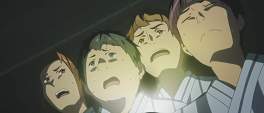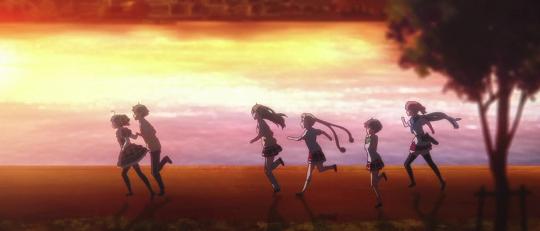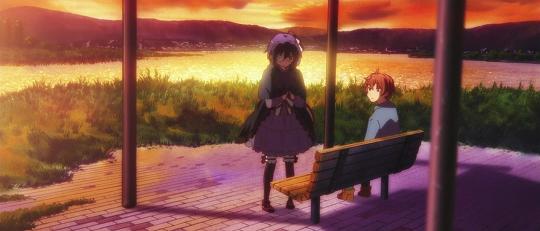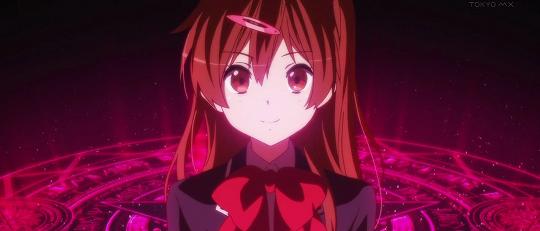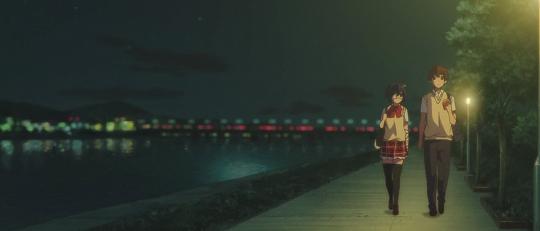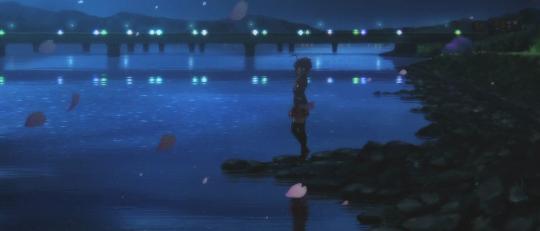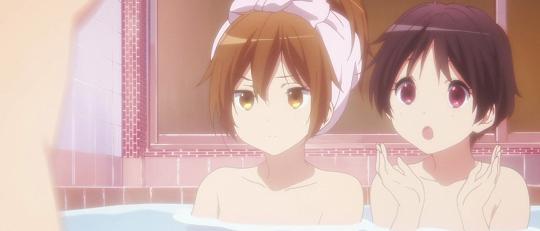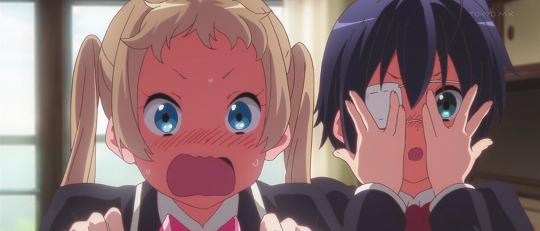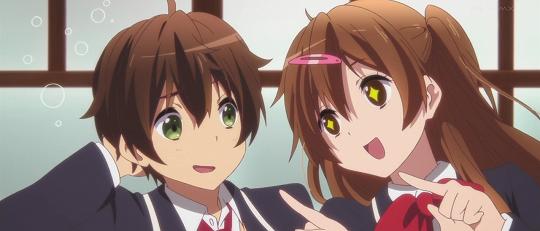The majority of Chuunibyou demo Koi ga Shitai! Ren (lit. Even With Eighth Grader Syndrome I Want To Be In Love, alt. Love, Chuunibyou and Other Delusions -Heart Throb-) is forgettable fluff. The core relationship between recovering chuunibyou Yuuta and incurably afflicted Rikka that came to a head in the first series is the focus this time around and instead of the clear split between light humour and super heavy drama, this second series is almost one hundred percent affable comedy. There are diversions such as a competitive napping contest and a school trip but otherwise this is a by the numbers campus love comedy.
In an attempt to inject some drama into an otherwise undramatic and glacially moving relationship, a friend from Yuuta’s past makes an appearance: the similarly ex-chuunibyou Satone who sports a mane of pink hair and shrill, borderline hysterical laugh that becomes somewhat of a warning siren throughout. She is the only notable addition to a series that was already heavily weighted towards females and the story is content to shed Yuuta’s only other male friend, Makoto, who becomes a lot like YuruYuri’s Akari in being invisible most of the time. When he isn’t wearing the anime equivalent of blackface and being preyed upon by a predatory male classmate of course.
Indeed the series is a bit scattershot with its representation of homosexuality with an openly and refreshingly frank girl from Yuuta’s class followed by different aggressive girl who makes subversive overtures towards the child-like Sanae. It’s quite the difference in portrayal, however the latter does take place during one of the best episodes of the series thanks to its rather searing message towards the extremes of idol otaku culture.
The aforementioned Sanae has been wooed away by a girl claiming to be “Mori Summer”, an internet figure from Sanae’s youth who touted a pseudo-spiritual religion with talk of faeries, pixies and ghosts. Mori Summer of course turned out to be Shinka who desperately tries to deny her chuunibyou past, causing Sanae to call her “Fake Mori Summer”. The interloper - watched by Sanae’s friends - takes photos and eventually makes an overt sexual advance towards Sanae until a showdown, in the series trademark imitation magical girl fights, between her and Shinka takes place.
The reason for this girl’s fanatical interest in Sanae? Her “purity”. And the cause for her to instantaneously lose interest in Sanae? The revelation that she has in fact already kissed someone. The fantasy is broken and Sanae has been ousted as nothing more than an actual person rather than a snow-globe ideal, forever perfect and untouchable. Cue tears and a sharp exit. It’s certainly not much of a stretch to see the analogies with the AKB48 zeal that the internet hyperbole machine revels in but it does seem like somewhat of an incongruous message when buried between a beach excursion and an episode whose highlight was a new umbrella.
It’s easy to be glib about the series though when it has obviously made a conscious decision to switch away from the emotional ramifications of the malady shared by the title: chuunibyou. There is no mention of Rikka’s father or any sign of her maturing beyond her all-encompassing and vivid imagination - when compared to the underlying message of the first series then it is at least consistent. The introduction of Satone does introduce a different perspective on the affliction with her stick-on pink heart a potent metaphor for the emotional burden chuunibyou obfuscates. Fundamentally though there isn’t enough insight to believe that was point of this second series. The shift away from drama does mean that, episode-to-episode, it’s an easy watch with the central pair going on cute dates and all of the characters having a pleasing array of clothing, wonderfully fleshed out by Kyoto Animation’s eye for detail. It’s telling that even though there are more segues into the hyperactive alternative fantasy world than the first series, they stand out far less and are always balanced by real world dorkiness like having to clamber down from the top of a shoe locker or just a quick cut to the ladle-wielding sister.
There is the lingering question once Chuunibyou-ren (or rather charmingly, 2Chu2Koi) has concluded as to whether it was really justified. It added vanishingly little to the core, puppy-love relationship of Yuuta and Rikka with even Sanae and Shinka’s fanfiction-baiting friendship afforded more development. Even on the subject of chuunibyou there isn’t any kind of wisdom or, woe betide, judgement on exactly what the broader impact of the syndrome is. So all that’s left is a competent, easy-to-watch light comedy with the occasional worrisome representation and a possible middle-finger to idol fanatics. So the question that I posed after the first series: would a second offering be more light-hearted after the first’s rather conclusive ending? Definitely. Whether that’s a good thing or not depends on your opinion towards twee shenanigans, inoffensive humour and the constant tease of progression.




